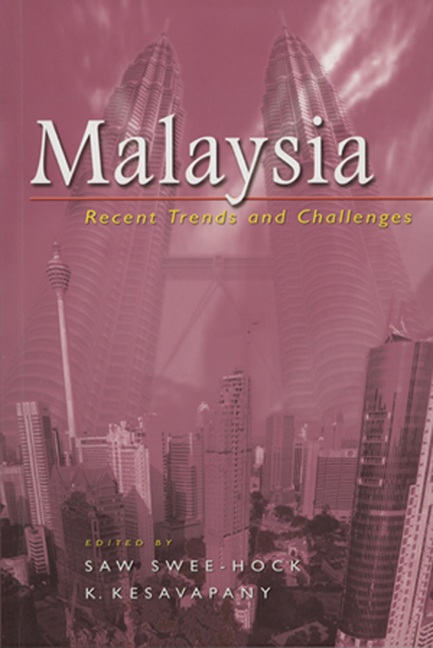Book contents
- Frontmatter
- Content
- Preface
- Foreword
- Contributors
- 1 Population Trends and Patterns in Multiracial Malaysia
- 2 The Emerging Politics of Islam Hadhari
- 3 Bangsa Malaysia: Vision or Spin?
- 4 The 2004 Malaysian General Elections: Economic Development, Electoral Trends, and the Decline of the Opposition
- 5 The UMNO-PAS Struggle: Analysis of PAS's Defeat in 2004
- 6 The Malay Electorate in 2004: Reversing the 1999 Result?
- 7 UMNO and BN in the 2004 Election: The Political Culture of Complex Identities
- 8 Malaysia's Civil Service Reform: Mahathir's Legacies and Abdullah's Challenges
- 9 Reinventing Governance in Corporate Malaysia: The Challenges Ahead
- 10 Globalisation and Ethnic Integration in Malaysian Education
- 11 Globalisation and the Challenges Facing Malaysia's Economy
- 12 Promising Start to Malaysia-Singapore Relations
- Bibliography
- Index
5 - The UMNO-PAS Struggle: Analysis of PAS's Defeat in 2004
Published online by Cambridge University Press: 21 October 2015
- Frontmatter
- Content
- Preface
- Foreword
- Contributors
- 1 Population Trends and Patterns in Multiracial Malaysia
- 2 The Emerging Politics of Islam Hadhari
- 3 Bangsa Malaysia: Vision or Spin?
- 4 The 2004 Malaysian General Elections: Economic Development, Electoral Trends, and the Decline of the Opposition
- 5 The UMNO-PAS Struggle: Analysis of PAS's Defeat in 2004
- 6 The Malay Electorate in 2004: Reversing the 1999 Result?
- 7 UMNO and BN in the 2004 Election: The Political Culture of Complex Identities
- 8 Malaysia's Civil Service Reform: Mahathir's Legacies and Abdullah's Challenges
- 9 Reinventing Governance in Corporate Malaysia: The Challenges Ahead
- 10 Globalisation and Ethnic Integration in Malaysian Education
- 11 Globalisation and the Challenges Facing Malaysia's Economy
- 12 Promising Start to Malaysia-Singapore Relations
- Bibliography
- Index
Summary
Overview of the Results of the 2004 General Election
The outcome of the 11th Malaysian general election of 21 March 2004 was staggering not because of the ruling Barisan Nasional (BN) coalition's triumph, but rather because of the magnitude of its victory. Garnering 63.8 per cent of the popular vote, the result meant that BN now controlled 199 out of 219, or 90.9 per cent, of parliamentary seats, rendering an unprecedented BN domination of parliament. Out of 445 state legislative assembly seats contested in Peninsular Malaysia, BN won 394, or 88.5 per cent.
In contrast, the erstwhile main opposition party, Parti Islam SeMalaysia (PAS), had its representation drop from 27 to 6 in parliament and from 98 to 36 state legislative seats. After one term in PAS's hands, Terengganu was regained by BN, who almost achieved a similar feat in Kelantan, whose 45 state legislative assembly seats are now almost evenly divided between PAS's 24 to BN's 21. The mainly Chinese-based opposition party, the Democratic Action Party (DAP) maintained its ground by winning 11 parliamentary seats and 15 state seats, as compared to ten parliamentary seats and 11 state seats in the previous elections in 1999. The other major opposition party, the National Justice Party (Keadilan), declined from representing five parliamentary and four state constituencies in 1999 to holding only a single parliamentary seat in 2004. This sole seat was won by Dr Wan Azizah Wan Ismail, wife of Anwar Ibrahim, the former deputy prime minister sacked from all government and ruling party posts in September 1998 over allegations of corruption and sexual impropriety.1 Dr Wan Azizah held on to Penang's Permatang Pauh parliamentary seat which had been represented by her husband from 1982 until 1999, and even then, with a slim majority of 590. This pales in comparison with her 9,077 majority in 1999, and apparently reflects a nationwide decline in the people's enthusiasm for the reformasi, the Anwar Ibrahim-led reform movement which strives to eradicate corruption, cronyism, and nepotism and thereby seeks to restore justice throughout society.
- Type
- Chapter
- Information
- MalaysiaRecent Trends and Challenges, pp. 100 - 131Publisher: ISEAS–Yusof Ishak InstitutePrint publication year: 2005



